What are the symptoms of intestinal damp heat

|
Intestinal damp-heat is a term in traditional Chinese medicine. It refers to the situation where internal damp-heat occurs due to intestinal damp-heat syndrome, which blocks the intestines. Patients often experience symptoms such as abdominal pain and diarrhea, and are prone to bloody stools, so it is also called large intestine damp-heat syndrome. Patients often experience fever and thirst, and symptoms such as tenesmus or watery diarrhea. It can be treated with certain Chinese medicine methods. What are the symptoms of intestinal damp heat Fever and thirst, abdominal pain and bloating, diarrhea with pus and blood, tenesmus, or sudden watery diarrhea, or uncomfortable diarrhea with yellow, thick and foul-smelling feces, burning sensation in the anus, short and yellow urine, red tongue, yellow and greasy coating, and slippery and rapid pulse. Evil dampness and heat invade the intestines, obstructing the flow of Qi. If Qi stagnates, it will cause abdominal pain and bloating. Dampness and heat invade the intestines. Qi is disordered, the clear and turbid cannot be distinguished, and the fluid tends to flow downward, resulting in violent intestinal bleeding; dampness and heat are accumulated internally, damaging the intestinal network, and bloody diarrhea is caused due to stasis and heat. Fire is urgent and dampness is sticky. When damp-heat and epidemic toxins invade the intestines, the intestinal qi is blocked, which causes intermittent abdominal pain and the desire to have diarrhea, but the bowel movement is not smooth, the anus is heavy and has a sign of tenesmus. When the damp-heat in the intestines does not dissipate and the filth is accumulated and not discharged, the diarrhea is uncomfortable and the feces are yellow and thick, with a foul smell, and there is a burning sensation in the anus during defecation. When the damp-heat evaporates to the outside, the body becomes hot. When the heat evil damages the body fluid and diarrhea consumes the fluid, the person becomes thirsty and has short yellow urine. The tongue is red, the tongue coating is yellow and greasy, and the pulse is slippery and rapid, which are signs of internal accumulation of damp-heat. Treatment with traditional Chinese medicine 1. Prescription: Diyu San with modifications. Sanguisorba officinalis 10g, Rubia cordifolia 10, Charred Gardenia 1g, Scutellaria baicalensis, Coptis chinensis 3g, Notoginseng powder 6g (for mutual use), Sanguisorba officinalis powder 3g (for mutual use). 2. Add or subtract: If there is obvious umbilical and abdominal pain, add 6g of black plum and 10g of phellodendron; if there is obvious lower abdominal pain, add 10g of white peony root, 12g of saposhnikovia root, 10g of tangerine peel, and 15g of stir-fried white atractylodes. Prevention and health care: Enterovirus is mainly transmitted through fecal, oral or respiratory droplets, and can also be transmitted through contact with the patient's skin and mucous membrane herpes fluid. Various oxidants (potassium permanganate, bleaching powder, etc.), formaldehyde, and iodine can inactivate viruses. During the season when enterovirus is prevalent, parents should reduce their children's visits to public places as much as possible, especially to epidemic areas where the infection has already broken out; strengthen their children's personal hygiene, wash their hands frequently, and regularly use soap and 84 disinfectant to disinfect daily necessities, toys, and diapers; Milk containers and tableware should be boiled and disinfected; clothes and bedding should be exposed to the sun and the room should be kept ventilated; pay attention to food hygiene and do not drink raw water or eat raw or cold food; breastfeeding mothers should bathe and change clothes frequently and clean nipples before feeding; when someone in the family is infected with enterovirus, they should be properly isolated to reduce the chance of infection; if a child shows symptoms such as fever or rash, remember to go to a regular hospital as soon as possible. Children who are sick should stop going to kindergarten or school to avoid infecting others. |
<<: What foods should be avoided when you have measles?
>>: How to Reduce Gout Symptoms
Recommend
Is it kidney deficiency if a man has cold hands and feet?
When a man has cold hands and feet, it does not n...
How to treat tonsillitis? Why not drink some cabbage root soup
Ms. Zheng from Wuhan provided: My grandson is 5 y...
The bleeding site of hemoptysis is
There are many places where hemoptysis bleeds, su...
Is yellow urine an early symptom of hepatitis? , what are the early symptoms of hepatitis?
It is a truth that everyone understands that the ...
Mustard gas poisoning
Mustard gas is a toxic biological gas. This gas a...
What should I pay attention to when having lumbar disc herniation?
Lumbar disc herniation is a very common disease, ...
Will taking Chinese medicine affect sexual function?
Now many people in our lives have begun to believ...
Toxoplasma symptoms
Toxoplasma is an intracellular parasite that can ...
What should I do if I still itch after being stung by a bee 10 days later?
Generally speaking, after being stung by a bee, o...
What causes abdominal bloating and frequent flatulence? How to prevent health care?
Do you often fart when your stomach is bloated? I...
What is oil massage? What are the effects of oil massage?
There are many ways to use essential oils in main...
What are the fastest ways to get rid of acne caused by heat?
In fact, acne is most likely to occur on the face...
What causes breathing difficulties?
There are many issues in life that need attention...
What are the symptoms of pregnancy?
When pregnant, women will show a variety of sympt...
What's the matter with the red spots on the baby's soles?
The symptoms in babies may be caused by fungal in...









